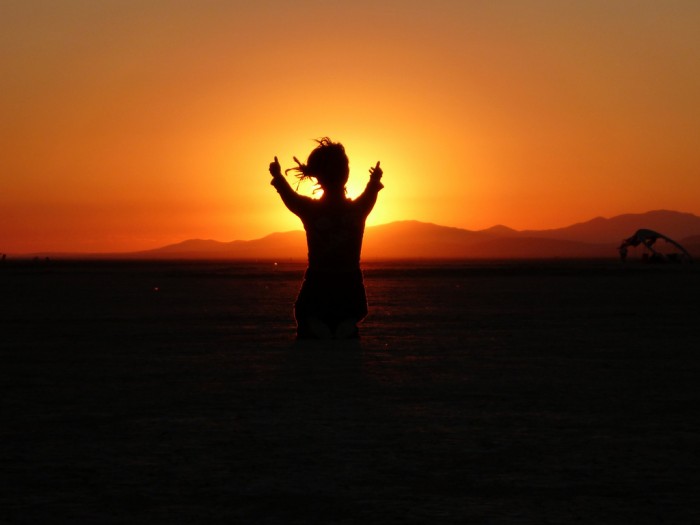
My eyes open not to the light but to the expectation of light.
That is a special feeling that one can get quite sweetly attached to.
For years now, I have chosen to wake up at least an hour before sunrise.
The witnessing of the phenomenon of light banishing darkness every morning chases away many mind-based falsehoods.
Refreshed and reassured, I embrace the day fully.
There is something about the morning, especially when it is not light yet, but we know that soon the dark will be over and light will be upon us.
Greeting the Sun with a Mantra.
When the first rays of light scan my part of the earth, my slumbering body awakens naturally like the birds and flowers in my garden.
I notice my mind is beginning to hum the same awakening Mantra that my grandfather and teacher, Baba, taught me before I could even speak. Because I absorbed the Gayatri Mantra with all my being and without any resistance or questions, my mind began humming it non-stop, even though I could not actually recite the tongue-twister.
Now, every morning, my mind begins its habitual humming, and that is a keen way to awaken to the breaking dawn and all its breathtaking, electric magnificence.
According to Ayurveda, the ideal time to arise is about two hours before dawn, around 4:30 to 5:00 a.m. This is the time when there is maximum Sattva, or vibration of purity and perfection, in the universe. Some exceptions to this rule of rising so early are the very young, the very old, parents with small children, and convalescents who may require more sleep.
Traditionally, the mantras are either the Surya Namaskar Mantras to greet the Sun or the famous Gayatri Mantra.
Consciously thought or uttered words in any language can also work like Mantras.
Restfulness in Wakefulness.
Rather than simply jumping out of my bed, I have been taught to become restful in my wakefulness first.
Sleep is a tiring activity. The vibration of inertia, called Tamas in Sanskrit, has cocooned me and held me motionless for several hours to witness the dreams and desires of the subconscious.
Now I rest in awareness of my wakeful consciousness and all its attending significance.
Upon waking, I watch my breath—becoming aware of my softly rising and falling chest. My spine reminds me that I am here, thanks for paying attention. Slowly and steadily, in this pause between complete inertia of sleep—Tamas—and total activation of the awakened state of the energized vibration—Rajas—I prepare to come awake with poise and mastery of the moment, through embracing the vibration of spiritual ascendency—Sattva.
Energizing the Body.
I remember waking up excited as a kid and leaping into my Baba’s lap, unmindful of his meditating state or posture of contemplation. He would, of course, make room for me immediately and snuggle me into his huge warm blanket. Baba taught me a marvelous method to energize myself with my own body heat, first thing in the morning.
We rubbed our palms together vigorously and when they became nice and warm, we put them on our eyes and took three long breaths, all the way in and all the way out.
Ah! We gave our closed eyes a golden gift of radiance that burst forth like fountains inside them. Then, we slowly moved our hands down our face and on our chest and abdomen, and even lower over our knees and thighs, legs and ankles and toes.
Worshipping Mother Earth.
We kept moving our hands, until we touched the Earth below us, placed our hands squarely on her surface, and again took three long breaths, in and out, and uttered the words:
Om Prithivi devyyaya Vidhmahe
Sahasra murthaye cha Dheemahe
Tanno Prithvi Prachodayath.
The Mantra to pay Homage to Mother Earth.
I remember how the sky heard me love earth, and so did the wind, and because of my childish exuberance, I think everyone knew I was awake.
It was pure joy to be alive and then to be truly awake to all that there is, in this aliveness.
Self Care.
Ayurveda recommends a beautiful flow of rituals that make the morning a great time to take care of ourselves and lavish our being with love and attention.
Ayurveda encourages daily elimination by ensuring a light and easy to digest meal the night before. The herb Triphala, taken the night before can also assist regularity in elimination. If chronic constipation persists or there are other elimination irregularities, an Ayurvedic Vaidya (healer) should be consulted. Squatting can also promote the urge and so will a drink of warm water first thing in the morning, if required.
Splashing the face and eyes with cool water is great to begin with and then taking 12 handfuls of water to rinse the mouth fully is recommended. The water should be swished in the oral cavity with vigor so that food particles can get dislodged.
The teeth should be brushed with herbal toothpastes and powders that have a predominance of astringent and bitter tastes with some pungency also. Sweet tasting products promote dental decay rather than discourage it, according to Ayurveda.
The tongue can be cleaned using a U-shaped tongue cleaner—the Copper ones work well for almost all people and Dosha , or constitution types. Caution should be exercised that the tongue is scraped gently without any abrasion and damage.
In healthy people, an additional ritual called Gandush can be performed. In this, one fills the oral cavity to maximum capacity with warmed sesame oil and holds it for as long as one can (with cheeks in full blown position) and then spits it out.
This procedure nourishes the entire oral cavity and strengthens teeth, gums, jaws, voice and works excellently to combat TMJ (Temporomandibular joint dysfunction). However, one should check with an Ayurvedic Vaidya before embarking upon this ritual, as digestion and elimination should be in optimum state as a pre-condition.
Ayurveda recommends that people who wish to maintain their health should apply oil on their body daily: a small ritual of self massage called Abhyangam for which warm sesame oil is recommended, followed by a bath or a shower with hot water.
Yoga postures are recommended to keep the body flexible, and one should try to customize the personal yoga practice based upon needs of the body and the requirements of the Ayurvedic Dosha or constitution (as per recommendations of the Ayurvedic Vaidya).
Pranayama, or breath discipline, not only infuses the body with Prana (vitality) and healthy oxygen, but also begins to balance the mind, as according to Ayurveda, the breath and mind have a close relationship.
The calming effect of Pranayama naturally leads into a meditative state, if seek to enter one.
Meditation aligns body, mind and soul.
In meditation, I become one with the bliss within myself. Fresh in body, aligned with sun, earth and breath, I am grateful to the muscles and bones for bending and flexing upon my request. I am totally appreciative of my existence on earth, refreshed and cleansed in body and mind.
I begin my day blessed by the healing and self-love rituals of Ayurveda.
Now, with hands that are rendered soft with oiling, I reach out to fresh life-giving foods and begin cooking my breakfast of the day.
Ah, it is another illumined morning yet again!
Nowhere to go and nothing to do but expecting the light within and then receiving it—that is the miracle, day after day.
Relephant:
Waylon with Ayurveda expert John Douillard on Why we can’t Sleep.
Author: Acharya Shunya
Apprentice Editor: Anet Kalpakçiyan/ Editor: Khara-Jade Warren
Image: sethoscope/ Flickr











Read 1 comment and reply